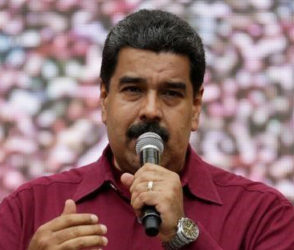CARACAS (Reuters) – With many Venezuelans angry at the government and planning to sit out a July 30 vote for a new superbody assembly, President Nicolas Maduro has ordered all state workers to take part, seeking to avoid an embarrassingly low turnout.
After three months of anti-government unrest that has killed at least 90 people, Maduro has called for the Constituent Assembly, with powers to reform the national charter and supersede other institutions, in an election he says will bring peace.

Opponents plan a rival, unofficial referendum on July 16 to give Venezuelans a say on what they view as a sham poll by the leftist president, accusing him of trying to formalize a dictatorship in the South American OPEC nation.
Maduro has been trying to drum up his base, mostly state workers and poorer Venezuelans.
“If there are 15,000 workers, all 15,000 workers must vote without any excuses,” he told red-shirted supporters in the jungle and savannah state of Bolivar on Thursday night.
“Company by company, ministry by ministry, governorship by governorship, city hall by city hall, we’re all going to vote for the Constituent Assembly. Do you understand? Do you agree,” he said to a chorus of “Yes!”
Roughly 2.8 million state employees, a sizeable part of Venezuela’s population of around 30 million, are often obliged to attend government rallies. Some have said they have already come under pressure to vote on July 30.
“This is crazy. [They’re saying], workers who don’t go to vote will be sacked,” said one employee of state oil company Petroleos de Venezuela S.A., asking to remain anonymous because he is not authorized to speak to media.
“I’ll vote, but null. I’m not going to vote for any of these nuts running for the assembly,” he added.
A second PDVSA worker, who supports the opposition, said company auditoriums were being used to give presentations about the constituent assembly. “I’m worried … but I’m committed to the cause and I won’t vote,” he said.
Many familiar faces of the ruling Socialist Party are vying for a seat, including former Foreign Minister Delcy Rodriguez and powerful party No 2 Diosdado Cabello. Maduro’s wife and son are also running.
The opposition has said Maduro’s pressure on workers is another sign he is violating democracy. Opponents are calling on him to agree to elections to replace him amid a brutal economic recession that has Venezuelans unable to afford basic food and medicine.
According to a recent survey by pollster Datanalisis, 67 percent of Venezuelans oppose the new assembly to rewrite the constitution, which was reformed by late leader Hugo Chavez in 1999.
The Catholic church has also come out against the plan.
“This congress has been pushed forward by force and its result will be to render constitutional a military, socialist, Marxist and communist dictatorship,” Archbishop Diego Padron, who heads the main church authority Venezuela’s Episcopal Conference, said yesterday.
The opposition coalition is hoping to further delegitimize Maduro’s plans with their own vote, which will ask Venezuelans their views on rewriting the constitution, the opposition’s alternative push for an election, and the military’s responsibility for “recovering constitutional order.”
Should Venezuelans overwhelmingly vote against Maduro, lawmaker Freddy Guevara said the opposition would call for a national strike to pressure the president.
Voting for the referendum will take place in some 1,766 sites and Venezuelans abroad, many of whom have fled Venezuela’s meltdown, can participate, opposition lawmakers announced on Friday. University deans will oversee the process.
“This is a civic rebellion,” Guevara said during the press conference. “We’re at a historic moment, I’m sure there will be a before and after July 16.”
State prosecutor Luisa Ortega has also broken ranks with Maduro over the constituent assembly. Amid an apparent bid to oust her, the Supreme Court named a deputy prosecutor, whom Ortega has rejected as illegitimate.
Yesterday, the court-appointed deputy prosecutor entered the headquarters of the state prosecutor by hiding in the trunk of a car but was expelled by security personnel, a source at the prosecutor’s office told Reuters.

